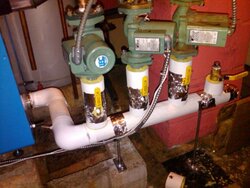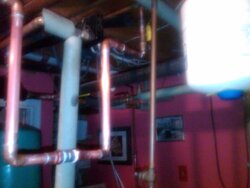Hello
We just installed a Buderus G115WS to save oil but all the pipes connected really radiate alot of heat! There is all kinds of different pipe insulation like Foam, Rubber, 1/2 " and 1" Fiberglass with white paper.
The pipes get very hot. Has anyone done this? Does it save money?
So far I tried insulating the Header Manifold with Fiberglass and Zeston2000 fittings for the 90 degree black iron fittings in the return line and using Reflextix Foil Tape I got at home depot.
See Link http://www.specjm.com/products/pvcpipeaccessories/zeston2000.asp
http://www.specjm.com/products/pvcpipeaccessories/zeston2000.asp
See pic below.
We just installed a Buderus G115WS to save oil but all the pipes connected really radiate alot of heat! There is all kinds of different pipe insulation like Foam, Rubber, 1/2 " and 1" Fiberglass with white paper.
The pipes get very hot. Has anyone done this? Does it save money?
So far I tried insulating the Header Manifold with Fiberglass and Zeston2000 fittings for the 90 degree black iron fittings in the return line and using Reflextix Foil Tape I got at home depot.
See Link
 http://www.specjm.com/products/pvcpipeaccessories/zeston2000.asp
http://www.specjm.com/products/pvcpipeaccessories/zeston2000.aspSee pic below.



